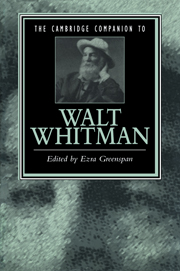Book contents
- Frontmatter
- 1 Introduction
- 2 “As If I Were With You”
- 3 Fratricide and Brotherly Love
- 4 Reading Whitman’s Postwar Poetry
- 5 Politics and Poetry
- 6 Some Remarks on the Poetics of “Participle-Loving Whitman”
- 7 “Being a Woman ... I Wish to Give My Own View”
- 8 Appearing in Print
- 9 “I Sing the Body Electric”
- 10 Walt Whitman
- 11 Borge's "Song of Myself"
- Suggestions for further reading
- Index
- Series List
3 - Fratricide and Brotherly Love
Whitman and the Civil War
Published online by Cambridge University Press: 28 May 2006
- Frontmatter
- 1 Introduction
- 2 “As If I Were With You”
- 3 Fratricide and Brotherly Love
- 4 Reading Whitman’s Postwar Poetry
- 5 Politics and Poetry
- 6 Some Remarks on the Poetics of “Participle-Loving Whitman”
- 7 “Being a Woman ... I Wish to Give My Own View”
- 8 Appearing in Print
- 9 “I Sing the Body Electric”
- 10 Walt Whitman
- 11 Borge's "Song of Myself"
- Suggestions for further reading
- Index
- Series List
Summary
“Must not worry about George, for I hope the worst is over - must keep up a stout heart.”This jotting from Whitman's notebooks early in 1863 is a vivid reminder of the person around whom, for Whitman and his family, the whole of the Civil War seemed to revolve for the full four years of its duration. A great deal of attention has by now been paid to everyone and everything else that was of central concern to Whitman at this time. His fierce commitment to the Union cause; his boundless admiration for Lincoln; above all, his tender yet invigorating care for the sick soldiers in general and the complex passion of his attachment to a few individuals in particular - all these matters have been extensively studied, not only for the insights they offer into Whitman's character but also for the light they throw on his poetry. By contrast, Whitman's wartime connection with his younger brother George (who was thirty-two when he entered the army, to the poet's forty-two) has been treated as at best a relatively minor matter of merely biographical interest. On closer examination, however, this fraternal relationship begins to assume much greater significance. Indeed, it could be argued that it was at least partly through George that Whitman was led to an intimate understanding of the real, hidden nature of the war, and that it was around George that Whitman was able (perhaps unconsciously) to arrange several of those imaginative configurations that articulated his hopes and anxieties and that supplied the deep structure of his war poetry.
- Type
- Chapter
- Information
- The Cambridge Companion to Walt Whitman , pp. 27 - 44Publisher: Cambridge University PressPrint publication year: 1995
- 1
- Cited by

